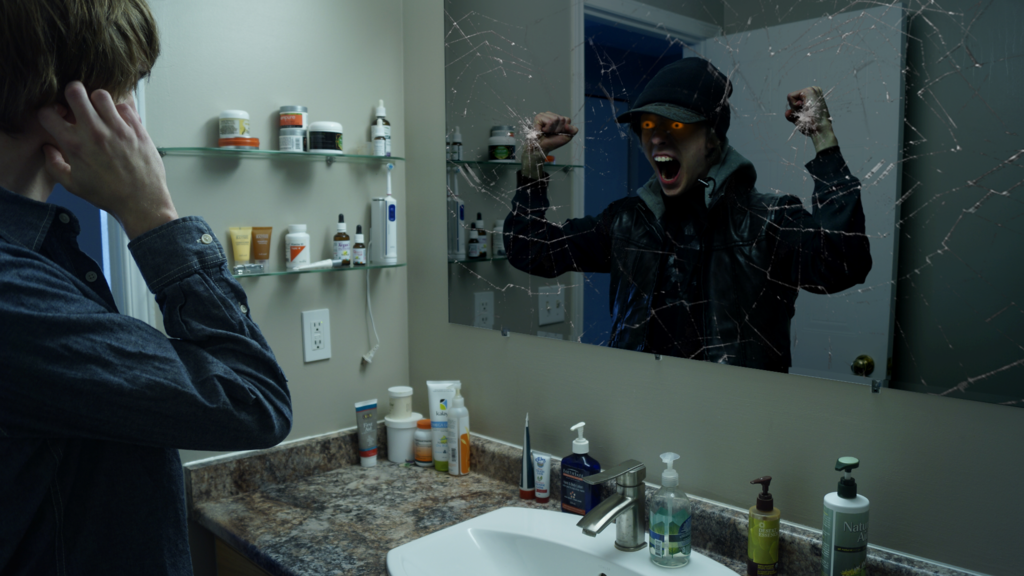Who we are really doesn’t need to be fixed and so what this means is that if we are trying to fix ourselves then what we’re trying to fix isn’t us. It’s some kind of idea, some kind of a formal construct, and so even if we were able to fix it this would only add to our problems. It would only add to our problems because the inevitable result of our fixing-type action is that we get even more confused about ‘what we are’ and ‘what we aren’t’ than we were to start off with.
This is where all our problems come from in the first place – we always think that the problem is ‘here’, or that the problem is ‘there’, and that we should perhaps do this, or that we should perhaps do that, but that is simply because we aren’t able to step back to see what’s really going on. Nothing we do to fix the problem (or solve the issue) is going to work when we’ve displaced that problem or issue onto something else! That’s just going to create new problems, and this is of course exactly what does happen. We run around in circles the whole time.
When we can’t (or won’t) see the problem where it actually is then this necessarily this means that we will see it where it isn’t and – therefore – it means that we will continuously tie ourselves up in knots trying to ‘solve the problem where it isn’t’. This becomes the pattern of our lives – we are kept busy continuously attempting to deal with our issues in the wrong place and this of course isn’t an entirely unfamiliar type of thing to come across. It is what we all do, just about all of the time.
The real problem is simply the fact that ‘who we think we are’ isn’t ‘who we are’. As Wei Wu Wei says, “What’s your problem? – Mistaken identity.” We could therefore say that the problem which we can’t correctly locate (and which we project here and there willy nilly) is the mistaken self, the ‘self we mistakenly think we are’. This is of course the one place we’re never going to look, it’s our blind spot. It’s like looking for your glasses when you have them on all the time – until you realise that you’ve got them on you’re never going to find them!
We could also talk about this blind spot of ours by saying that it has to do with the way in which we can’t help automatically perceiving our viewpoint on things as ‘the one and only right way’; no matter what viewpoint it is we happen to be utilising, we will always feel that is the correct one and so we can see that this constitutes a particularly diabolical trap. On a related note, the self or ego always feels itself to be ‘in the right’, no matter what, and so what we have here is the same trap. This peculiar ‘self-validating quality’ of the ego is of course well known to everyone; we can see it clearly in others even if we can’t see it in ourselves – this is the characteristic ‘stubbornness’ or ‘wilfulness’ of the ego, which is really just ‘foolishness in disguise’.
It could be argued that the ego can switch from ‘Teflon Mode’ (the mode where it feels itself to be entirely justified no matter what its circumstances might be) into a self-doubting or self-critical mode where everything sticks, no matter what. This, however, is the same thing, only backwards – we are now convinced that we are right when we say that we are wrong, and so we’re still right. We feel right both ways – the self or ego is always convinced that it’s right. We are ‘right’ even when we’re ‘wrong,’ and this is a function of the ‘black & white’ nature of thought, which always has to go either the one way or the other. From the point of view of our ‘confidence’ in what we’re doing this blindness is very welcome since being confident is what it’s all about (as far as we’re concerned), but from every other viewpoint it’s a total disaster.
We could also say that the ego’s situation is one of unmitigated subjectivity, since whatever side it chooses to be on is always going to be ‘the right side’. This can be seen in an argument or squabble where I will feel myself to be justified no matter what position I might choose to take – the mere fact that I am taking the position makes it right (although I am comedically unable to see this). As a result of this ‘unmitigated subjectivity,’ I can make the truth be anything I want it to be, without being able to see that this is what I’m doing. Just as the New Agers have always said, we ‘create our own reality’; we create our own reality only this is not a good thing. Far from being ‘a good thing’, being able to make reality whatever I want it to be (without knowing that this is what I’m doing) is the ultimate prison.
This state of hyper-subjectivity (which we could also see as a form of ‘hyper-suggestibility’) is what allows for the creation of the self, so to speak; the situation where my viewpoint becomes the right one as soon as I take it up is a necessary condition for the self to come into existence. The self is nothing more than ‘that situation where whatever I choose to be true (without knowing that I’m choosing) automatically comes to be true and this is why we can say that ‘Unconscious Mode’ is the same thing as ‘Self Mode’, or why we can say that to unreflectively believe that ‘I am this self’ is the same thing as ‘being unconscious’. To be conscious would be to see that there is actually no self there – only an ongoing illusion that we have got hung up on.
Talking about the state of hyper-subjectivity (i.e., the situation where reality is whatever we unconsciously choose for it to be) is a somewhat clumsy way of referring to polarity. Polarity gives rise to the Realm of Conflict, the Realm of Struggling and Striving, the Realm of Warring Opposites. Whenever we strive for the advantageous outcome we’re operating in the Realm of Warring Opposites – one opposite being ‘the advantage’ and the other being ‘the disadvantage’. It’s not possible to be engaged in purposeful behaviour (or to be exercising preference) without being in the RWO and nothing truly happens in this domain, everything always cancels itself out – this moment’s gain is the next moment’s loss.
We don’t see our actions in the Realm of Warring Opposites as being quintessentially futile, quintessentially pointless, and the reason for this is that we fondly imagined that when we get the advantageous outcome then we are going to be able to quit all the struggling and striving and enjoy a well-earned rest. This never happens however – there is never any rest (or peace) in Samsara, only the vain hope of it. It is because of our total lack of insight into the nature of polarity (which is to say, because of our conditioned inability to see that ‘advantage equals disadvantage’ or that ‘winning equals losing’) that we are as convinced as we are that we will one day be able to give up the interminable struggle of our purposeful activity; if it weren’t for our lack of insight into the fact that the dramas which we’re so attached to are profoundly hollow, we wouldn’t be able to keep up ‘the game of the self’.
It’s not just that the self ‘needs polarity if it is to continue to exist’ – which is true as far as it goes – but rather that the self is a polarity; more strictly speaking, the self is a polarity that cannot see itself for what it is. J.G. Bennett speaks of the Divided Self, the self which is divided against itself, the self which can only see only one half of the picture at any one time. If the Divided Self were to see both sides of the picture at the same time (both positive and negative, win and lose, advantage and disadvantage) then it would see itself to be a nullity and so the game would then come to an abrupt end. Just as long as we are operating on the basis of thought, this is the one thing we will never see.
Coming back to where we started in this discussion, we can say that when we are trying to fix ourselves, improve ourselves, to develop or progress ourselves, etc, (which we do all the time) then this is the consequence of the Divided Self being divided against itself in the way that it is. It’s the inescapable consequence of our lack of insight into the Cybernetic Paradox. Because of our blindness we are unknowingly engaging in the never-ending game of polarity, in other words; we get caught up in the never-ending vibration of YES and NO because we can’t see that YES equals NO. The self we think we are can never fix itself (or improve) itself – all it’s doing is spinning like a wheel and the more effort we put into fixing it the more rapidly it spins. The harder we try the faster we get nowhere…
James Carse makes this point by saying that all finite games are self-contradictory – the action by which we bring the play to an end, to a conclusion, is also the act by which we start it up all over again. That’s the way the wheel turns; STOP is at one end of the circumference of the wheel and GO is at the other end and so when we hurry to bring the game to a close we are rushing to start it up again. Trying to fix or improve the everyday self is really all about perpetuating it as it is, therefore – we’re perpetuating the drama, perpetuating the conflict, perpetuating the struggle, and this is how we maintain the suffering-producing error of the false self, which is ‘the self that we aren’t’. On the game’s overt level of meaning we are trying to wrap everything up so that we can finally put all this wearisome striving and struggling behind us, whilst on the covert level of meaning (unbeknownst to ourselves) our secret plan is to keep on prolonging it forever…
Image – wallpapercave.com







Stefan
If it ain’t broke, don’t fix it – because trying to fix it will cause us to become Sisyohos.
zippypinhead1
That’s a very neat way of putting it!
Sandeep
In the words of ug krishnamurti – There are actually no problems; rather, what we are saddled with are only solutions.